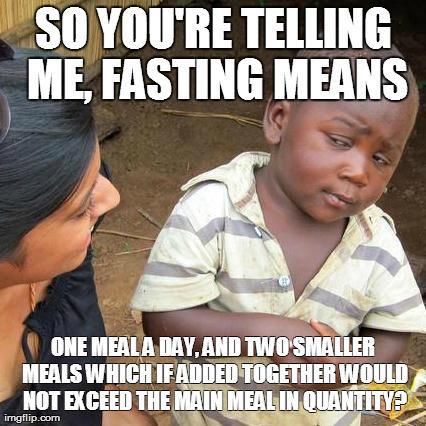There are three things, my brethren, by which faith stands firm, devotion remains constant, and virtue endures. They are prayer, fasting and mercy. Prayer knocks at the door, fasting obtains, mercy receives. Prayer, mercy and fasting: these three are one, and they give life to each other. (Saint Peter Chrysologus)
The penitential days and times in the universal Church are every Friday of the whole year and the season of Lent. (Code of Canon Law 1250)
What is Fast?
“Properly speaking fasting consists in abstaining from food, but speaking metaphorically it denotes abstinence from anything harmful, and such especially is sin.” (IIa IIae, Q147, a.2 ad.1)
Why do we Fast?
According to Saint Thomas Aquinas for three reasons: “ First, in order to bridle the lusts of the flesh, wherefore the Apostle says (2 Cor. 6:5, 6): “In fasting, in chastity,” since fasting is the guardian of chastity(…) Secondly, we have recourse to fasting in order that the mind may arise more freely to the contemplation of heavenly things (…) Thirdly, in order to satisfy for sins: wherefore it is written (Joel 2:12): “Be converted to Me with all your heart, in fasting and in weeping and in mourning.””(IIa IIae, Q147, a.1)
Extracts of the Apostolic constitution Paenitemini (February 17, 1966)
“Abstinence is to be observed on every Friday which does not fall on a day of obligation, while abstinence and fast is to be observed on Ash Wednesday.” (Chapter III, II, 2)
“The law of abstinence forbids the use of meat, but not of eggs, the products of milk or condiments made of animal fat. The law of fasting allows only one full meal a day, but does not prohibit taking some food in the morning and evening, observing—as far as quantity and quality are concerned—approved local custom.” (Chapter III, III, 1-2)
A person who is to receive the Most Holy Eucharist is to abstain for at least one hour before holy communion from any food and drink, except for only water and medicine. (Code of Canon Law 919)
Fasting in the Old Testament:
in the aftermath of sin to placate the wrath of God
1 Sam. 7:6;
1 Kings 21:20-21, 27;
Jer. 3:3, 7, 9;
John 1:2; 3:4-5
on the occasion of grave calamities
1 Sam. 31:13;
2 Sam. 1:12; 3:35;
Baruch 1:2, 5;
Judith 20:25-26
when special dangers are imminent
Judith 4:8, 12; 8:10-16;
Esther 3:15; 4:1, 16;
Psalms 34:13;
2 Chron. 20:3
in any case to obtain benefits from the Lord
1 Sam. 14:24;
2 Sam. 12:16, 22;
Esd. 8:21
external penitential practices are accompanied by an inner attitude of “conversion,”
1 Sam. 7:3;
Jer. 36:6-7;
Baruch 1:17-18;
Judith 8:16- 17;
John 3:8;
Zach. 8:9, 21.



